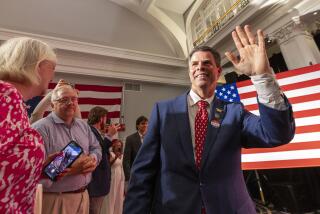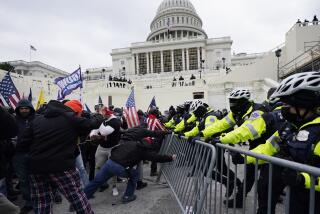Virginia GOP Picks North as Senate Nominee
- Share via
RICHMOND, Va. — Oliver L. North, the ramrod Marine who emerged from the Iran-Contra scandal as a conservative icon, won the Virginia Republican Senate nomination Saturday. His victory virtually ensured an unpredictable four-way contest for the seat now held by embattled Democrat Charles S. Robb.
At a tense and emotional party convention here, North comfortably defeated fellow conservative James C. Miller III, who had centered his campaign on the argument that North could not win in the general election. North carried 55% of the delegates’ votes, to 45% for Miller, the former director of the Office of Management and Budget under President Ronald Reagan.
“Bring on the liberal elites: (President) Clinton, Congress, (Ted) Koppel and above all Chuck (Robb),” North declared exuberantly in a speech just before the vote. “It’s time to take a stand: Whose side are you on?”
In selecting North--an intense, charismatic former lieutenant colonel who drew both renown and disdain for his combative 1987 testimony to a congressional committee investigating the Iran-Contra arms-for-hostages scandal--the state party ensured a public split with its top-ranking federal official. Republican Sen. John W. Warner has condemned North as unfit to serve in the Senate and said he will back an independent candidacy by Republican J. Marshall Coleman, a former state attorney general.
Although Coleman has not declared his candidacy, he seems certain to run now that North has been nominated. North’s victory also makes virtually certain a second independent candidacy from former Democratic Gov. L. Douglas Wilder, who contends his archrival, Robb, is so politically weakened that he cannot retain the Senate seat for the Democrats in November.
At the convention, North’s strength was greatest in the southern part of the state. He ran particularly well among rural voters and evangelical Christians, who responded enthusiastically to his Reaganesque appeals to family values and populist attacks on Washington.
In a pre-vote speech barely 10 minutes long, North never diverged from those themes. As if squeezing rounds from a rifle, he blasted away at the “imperial Congress” with its “precious parking places and gilded goodies,” the “bloated bureaucracy,” the “Washington crowd,” the “professional politicians” and the “ranting and raving powerbrokers.”
His brief references to policy centered on the conservative agenda for restraining government--the balanced budget amendment, the line-item veto and term limits--as well as opposition to abortion.
In remarks after the vote, North reprised those arguments in even more barbed tones: “Virginians are sick and tired of a Congress run by back-slapping good ol’ boys--and a White House governed by a bunch of 20-something kids with an earring and an ax to grind.”
North, a former National Security Council aide, has acknowledged misleading Congress during the Iran-Contra affair, in which the Reagan Administration traded arms to Iran for the release of U.S. hostages in Beirut and used part of the proceeds to finance the Nicaraguan Contras.
In proceedings brought by special prosecutor Lawrence E. Walsh, North was convicted of obstructing Congress, shredding government documents and accepting an illegal gift of a home security system.
But his convictions were overturned in 1990 by a federal appeals court, which ruled that North’s trial was tainted by testimony he gave to Congress while under a guarantee of immunity from prosecution.
In the aftermath, North quickly built a national following in conservative circles through speeches and extensive direct mail appeals for a foundation and political action committee he established.
Although Miller and North differed little on issues, the race polarized their supporters. At receptions, in hallways, waiting on line for credentials, the nearly 15,000 delegates here regularly combusted into spontaneous debates that inevitably turned on the same questions: Could North win a general election? Would Miller send to Washington the same stick-in-the-eye message as North?
Outside a party banquet Friday night, Robert Dunn, an engineer from the Richmond suburbs, was explaining why he supported North when Mark Roseneker, a Miller supporter from northern Virginia, challenged him.
“Why gamble for ideology when you can win the election,” Roseneker asked Dunn. “We are talking about a candidate (North) who reflects poorly on the Republican Party.”
Dunn replied: “I believe Oliver North can articulate the issues better, motivate the people better, give them a better direction. I believe we need somebody who can really send a message very clearly--not muddled like it has been for so long.”
As that exchange suggested, the race was less a choice between Miller and North than a referendum on North himself. To his supporters, North stands as “an American hero,” as William Luchsinger, a Vietnam War veteran and delegate from Arlington put it.
“If I had to go to war again, I’d want an Oliver North in front of me and an Oliver North behind me,” he said.
But even in this ardently Republican, overwhelmingly conservative audience, there were many who viewed North as untrustworthy and undependable--a sentiment encapsulated in a button worn by Miller supporters: “Ollie, thou shalt not lie.”
In the weeks leading up to the vote, North had endured a steady barrage of criticism from fellow conservatives and former colleagues, ranging from Reagan to former Chairman of the Joint Chiefs of Staff Colin L. Powell, who had raised questions about the former Marine’s character and veracity.
In remarks after the vote Saturday, Miller urged Republicans to unite behind North. But party leaders are concerned about defections from Miller supporters like Susan Miller (no relation) of Bedford, who slapped down a North flyer moments after the vote.
“I cannot support a man that Colin Powell can’t support and Gen. (H. Norman) Schwarzkopf can’t support,” she said.
The Democrats will select their nominee in a June 14 primary. Robb, who has been battered by allegations of marital infidelity, faces conservative state Sen. Virgil H. Goode Jr.; Richmond lawyer Sylvia Clute, and Nancy Spannaus, a supporter of political extremist Lyndon H. LaRouche Jr.
Polls have shown Robb with a substantial lead, but Goode has been pounding Robb with mailings and television advertisements citing memos from the senator’s own staff detailing allegations that he had committed adultery; Goode’s television ads accuse Robb of associating with “prostitutes and drug criminals.”
“If it were head to head, there’s a decent shot Robb could lose it,” said Democratic pollster Alan Secrest, who is not affiliated with any candidate. “But I don’t see how it will happen with two opponents . . . splitting the vote.”
The rest of the field will also fill in by then: Wilder and Coleman have until 7 p.m. on June 14, when the polls close in the Democratic primary, to file the relatively modest 15,000 signatures needed to launch an independent campaign.
Immediately after North’s nomination, a committee to draft Coleman announced that it had collected enough signatures to place him on the November ballot.
If the four-way race materializes, Virginia voters will face a choice with more angles than Fenway Park.
Keeping track of the grudges alone is a formidable task. Robb and Wilder have a longstanding feud; Coleman lost the 1981 gubernatorial race to Robb, and a second round to Wilder in 1989. The religious conservatives fervent for North still bristle at Coleman for abandoning his opposition to abortion in the 1989 race.
The political calculations are equally intricate. Paradoxically, the proliferation of candidates may help all of the contenders--each of whom, for different reasons, would likely have difficulty attracting an absolute majority of votes.
In a race with four candidates, though, the winner may need only about 40% of the vote--a prospect that helps the candidate with the strongest base of committed supporters.
North has such a base among evangelical Christians and other ideological conservatives. Wilder’s base is among African Americans, who constitute between 15% to 20% of the statewide vote in a general election. Robb has already won endorsements from the institutional ligaments of the Democratic Party--organized labor, the teachers union, and abortion-rights groups. To the extent Coleman can match such assets, it will be through what is expected to be the vigorous support of Warner, who remains popular in the state.
At the convention, the state party passed a resolution urging Warner to reconsider his decision to oppose North’s candidacy.
No public polls have yet tested support in a four-way race, but an adviser to one of the candidates said he believed that each would begin such a contest with backing from between 20% and 30% of the electorate.
In Republican circles, the initial estimation is that the race would come down to North and Wilder, with Robb and Coleman fading.
But at this point all predictions are a stab in the dark. “This is the most complicated race I’ve ever come across,” said Larry J. Sabato, a political scientist at the University of Virginia.
Times staff writer Jeff Leeds contributed to this story.
More to Read
Get the L.A. Times Politics newsletter
Deeply reported insights into legislation, politics and policy from Sacramento, Washington and beyond. In your inbox twice per week.
You may occasionally receive promotional content from the Los Angeles Times.










